It’s best to remove the liquid perfume and dispose of it at a hazardous waste facility, and then recycle the glass bottle if possible. Avoid pouring perfume down the drain or throwing it in the regular trash to prevent environmental harm.
No matter how much you love a scent, there will come a time when you’ll need to get rid of your old perfume. It’s not as simple as just throwing it away; there are a few steps you’ll need to take to dispose of old perfume safely. If you don’t know how to dispose of old perfume properly, it may end up in a landfill. Thus, it will poison groundwater and harm the ecosystem.
Perfume is made up of complex chemical compounds, many of which are toxic and can be damaging to air, water, and soil if not disposed of properly. Even with proper disposal, the chemicals can linger in the environment, leaching into the soil and water supply, and can cause significant damage to wildlife and aquatic life.
As Ecomaniacs, we will help you be responsible with old perfume so they don’t damage the environment.
Key Takeaways
- Perfume disposal requires careful consideration due to its chemical content.
- Throwing perfume in regular trash is not eco-friendly.
- Drain disposal of perfume can harm the environment.
- Utilize local hazardous waste facilities for proper disposal.
- Recycle or repurpose perfume bottles for sustainability.
Table of Contents
What is Perfume?
In general, perfume is a liquid mixture containing fragrant essential oils and aroma compounds, fixatives, and solvents used to give the human body, objects, and living spaces a pleasant scent. It is typically applied to the body in the form of drops or sprays.
Let us explain more about spray perfume and its components to help you understand how dangerous it can be to the environment.
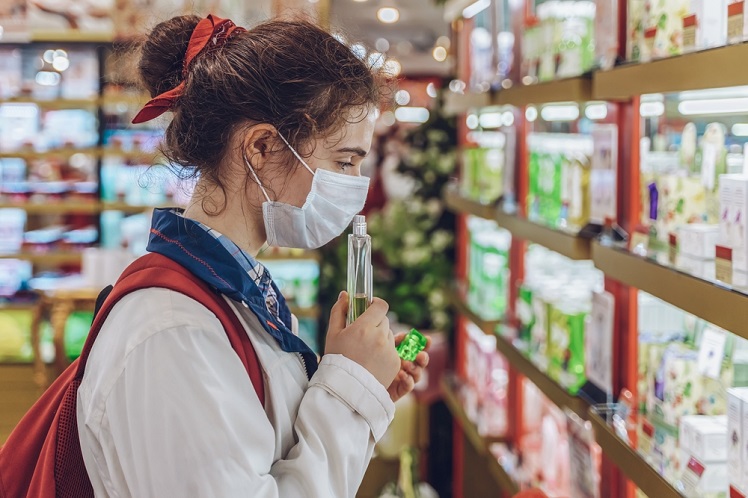
1. What is Perfume Made of?
Many people love to spray perfume because it provides a pleasant, long-lasting, strong scent. However, did you know how perfume is made today? Here are main ingredients that are contained in your favorite perfume and how they work to create a fabulous scent!
Essential Oils
Essential oils are derived from plants, and contain natural aromas. Citrus, lavender, eucalyptus, tea tree, and other floral oils are among the most prized essential oils used as scents.
Aroma Compounds
Aroma compounds are synthetically created molecules that are blended with essential oils to create a desired strong scent. For instance, eugenol for clove and cinnamaldehyde for cinnamon aroma.
Fixatives
Fixatives are used to slow down the evaporation of the perfume, allowing it to linger on the skin. Fixatives include resinoids such as benzoin, labdanum, myrrh and that were once acquired by using animal products now primarily synthesized because it is more practical, reliable, and moral to do so.
Solvents
Solvents are used to dissolve and dilute the other ingredients. Usually, perfume uses alcohol as the solvent.
2. Harmful Chemical in Perfume
Harmful chemicals commonly found in perfumes include phthalates, styrene, synthetic musks, and other synthetic fragrances. These chemicals can have a variety of adverse effects on both human health and the environment.
Let us explain more about these dangerous chemicals you must avoid in the following points below!
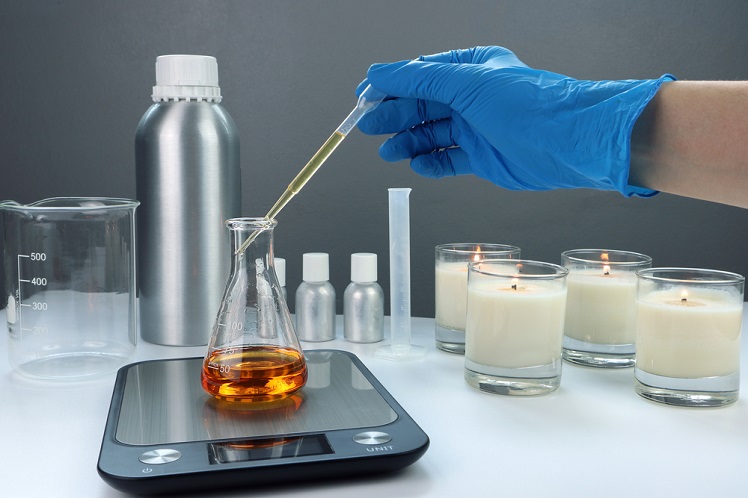
Phthalates
Basically, phthalates are endocrine disruptors that can interfere with the body’s hormones. This chemical will potentially lead to reproductive and developmental problems. You may find the chemical in synthetic fragrance.
Styrene
Styrene was declared an “anticipated human carcinogen” by the National Toxicology Program and the National Academy of Science. With long term exposure, styrene is known to cause central nervous system and kidney effects, headaches, depression,and cancer.
Synthetic Musks
Synthetic musks usually found in cosmetics and perfumes. They can accumulate in the environment, as they are not biodegradable. Moreover, they have been linked to health problems such as cancer, endocrine disruption, and reproductive toxicity.
Benzyl Acetate
This chemical is a substance with a pleasant, jasmine-like scent. It is often used in flavorings to add apple and pear flavors as well as in the production of perfume and cosmetics for its scent. However, it is recognized as a carcinogen that is especially responsible for pancreatic cancer.
Methyl Ethylene
Methylene ethylene is a solvent that is employed in the removal of paint. It has also long carried the warning that it “probably causes human cancer”. Due to its extreme toxicity, the FDA outlawed this component in fragrances in 1988.
However, the restriction isn’t particularly well enforced, as it can still be found on labels that mention “fragrance” as an ingredient.
3. What Does Using Expired Perfume Do?
Using perfume that has reached its expiration date can cause skin irritation and allergies. As the scent may have changed with age, the ingredients may no longer be safe to use. The fragrance may also not last as long, or have a different smell than when it was first purchased. Moreover, the color may become darker or lighter.

The longevity of a perfume depends on a variety of factors such as the concentration of oils in the scent and how it is stored. While some expire in less than a year, others can last up to ten years. The usual shelf life of a scent is between three and five years, though.
Furthermore, the study shows that chemicals in expired perfume may cause cancer. For example, the findings regarding carcinogenic effects from benzene in perfume to animals was published in 1979. Rats’ zymbal glands, which are sebaceous glands in the ear canal, developed malignant tumors as the first signs of carcinogenicity in animals.
Besides, the National Research Council of the Academy supported the National Toxicology Program‘s 2011 conclusion that styrene is “reasonably anticipated to be a human carcinogen”.
4. How Many Perfumes We are Using?
During the manufacturing process, the fragrance business generates 92 million tonnes of trash per year, according to Elle.com.
Moreover, another data from Recyclinginternational.com, each year, France sells 440 million cosmetic items and close to 50 million perfume and cologne bottles. And, not all of the perfume by-products and finish goods are reused. Therefore, it causes more perfume waste in the environment.
A study from University of Venice mentioned that among the thousands of scents available to the perfume business, 17 are among the most popular and chemically stable. The research shows that these scented molecules have been identified in all sampling sites, where concentrations in the inner city canals are up to 500 times greater. Thus, the amount of pollution shows that perfume contributes to a bigger environmental problem.
5. Are Perfumes Recyclable?
If we talk about the common perfume which contains chemicals, then the answer is no. However, the perfume bottle is definitely recyclable. Empty glass perfume and cologne bottles can be recycled into a variety of items, including whole new glass bottles, if disposed of properly in recycling bins or given back to the manufacturer.
For instance, TerraCycle and Good Chemistry have developed a free, nationwide initiative to recycle perfume bottles and caps for Good Chemistry perfume.
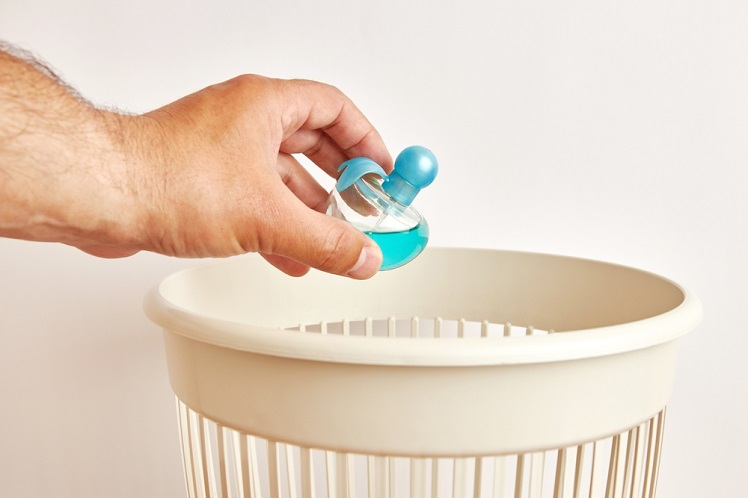
Or, you can simply place the perfume bottle and the other glass in the recycle bin. Follow the regulations set forth by your town when separating glass from other recyclables. On the day that recycling is collected, place your recycling can outside on the curb.
How Long Does Perfume Take to Decompose?
Perfume can take up to several years to decompose, depending on the kind of perfume and the environment it is in. Some perfumes are composed of synthetic ingredients and chemicals, which can take anywhere from a few months to several years to break down.
It all depends on the chemical makeup of the perfume, however they do have a tendency to deteriorate and oxidize over time. The average perfume will last three to five years.
Meanwhile, perfume bottles are usually made of glass. As you know, glass takes up to 4000 years to decompose naturally. It will harm the environment if you just throw away your perfume bottle on the ground. Therefore, we recommend you to recycle perfume bottles and caps into recycling programs.
Perfume Environmental Problems
Perfumes are a popular way to add a personal touch to our clothing and overall appearance. However, what many people don’t realize is that the production and use of perfumes can have a detrimental effect on our environment.
Here are some environmental impacts caused by perfume you probably didn’t know.
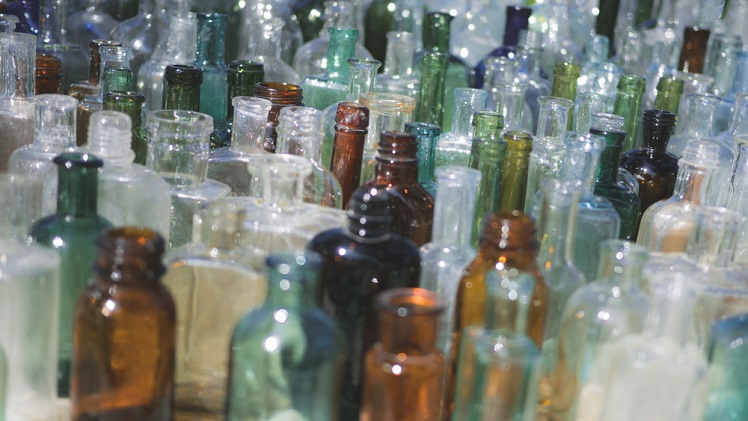
1. Ozone Pollution
Your perfume contains Volatile Organic Compounds (VOCs) with each spray. After you spray, the VOCs combine with sunshine and other airborne substances to create ozone pollution.
According to a study from journal Science by the National Oceanic and Atmospheric Administration (NOAA), the use of scented goods emits the same amount of chemical vapors as petroleum from vehicles, even though 15 times more petroleum is burned as fuel.
2. Landfill Problem
Another issue associated with perfume is the packaging. Many perfumes are packaged in plastic or glass containers, which can be difficult to recycle and can cause plastic waste. This plastic and glass waste can end up in landfills, where it can take hundreds of years to break down.
3. Water Contamination
Finally perfume’s chemical ingredients and containers may end up in the water and ocean without proper disposal. The National Oceanic and Atmospheric Administration (NOAA) published a report that wastewater treatment does not effectively remove these substances from the water, which inevitably come into contact with multiple aquatic ecosystems.
The Right Ways On How To Dispose Perfume
Disposing and recycling of old perfume is a necessary task, but it can be tricky to do it safely and responsibly. To ensure that your old perfume bottles do not end up in the wrong hands, the environment, or the trash, here are some tips to help you safely and responsibly dispose of perfume.
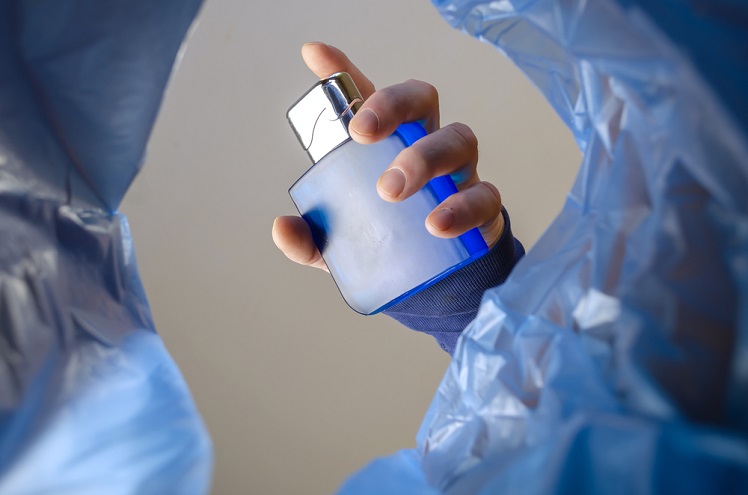
1. Take It To The Hazardous Waste Facility
If your old perfume contains flammable or hazardous materials, it must be taken to a hazardous waste facility. Contact your local government office to find out where the nearest hazardous waste facility is located.
2. Recycle The Container
If the perfume bottle is made of glass or plastic, it can most likely be recycled. You can recycle your empty perfume bottles along with the rest of your used glass as long as there is no fragrance within. Place the container in your regular recycling bin or take it to a recycling center.
3. Donate It
Consider donating your old perfume bottles which are still unused to a charity or thrift store. For instance, organizations like Sarah’s Circle and Connections for Abused Women and Their Children both welcome brand-new or unused perfume bottles. This is a good way to dispose while helping those in need.
4. Give It Away
If your unused perfume is still in good condition, consider giving it away to a friend or family member. See if your loved ones are interested in your old cosmetic goods by talking to them. Inform them that you no longer desire their scent and that, unless they request otherwise, you would probably give it. This is a great way to dispose while spreading some joy.
5. Re-purpose It Into Decoration
Did you know that your empty perfume can be a great decoration? Fill half of a perfume bottle with water. After that, insert a couple flower stalks. Keep these bottles as amusing, ornamental accents all over your house! You can also use empty perfume bottles as fun hanging decorations! Otherwise, you can recycle your empty perfume bottle.
Perfume Environmentally Friendly Alternatives
Traditional perfume and cologne can be harmful to the environment due to the use of synthetic chemicals and ingredients. Fortunately, there are now a number of environmentally friendly alternatives available, which offer great fragrances without the added environmental impact.
Therefore, we have compiled some eco-friendly fragrance products to replace your perfume. Let’s get started!
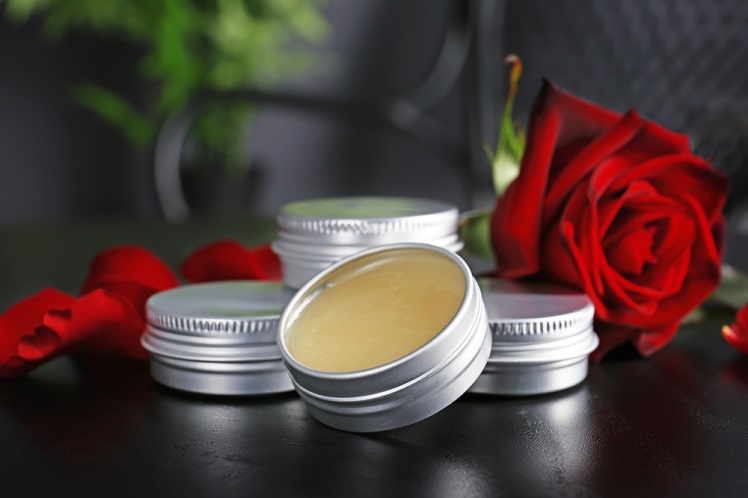
1. Oil Based Perfumes
They are one of the most popular eco-friendly alternatives to traditional perfumes and colognes. Made from a combination of vodka and essential oils, they are usually cold-pressed or steam-distilled to retain the natural scent of the plant.
For instance, Byredo Gypsy Water Roll-On Perfumed Oil is one of the best oil based perfumes according to Allure. Oil based perfumes provide a great way to enjoy a pleasant scent without any of the environmental impacts associated with traditional fragrances.
2. Solid Perfumes or Dry Perfumes
To avoid ozone pollution when spraying the perfume, you can change it into a solid one. As opposed to the liquid alcohol and water mixture used in eau de parfum, eau de toilette, eau de cologne, etc., solid perfumes or cream perfumes or dry perfumes, are fragrances in a solid condition.
Typically, a form of wax that has been originally melted provides the component that gives the cream its basis. It is also made of various dried herbs, natural beeswax available in the market.
3. Eco-friendly Perfumes
Besides its natural ingredients, an eco-friendly perfume also focuses on sustainable packaging. For instance, Henry Rose is an environmentally friendly perfume company that offers a variety of scents that are EWG and Cradle to Cradle Certified.
Henry Rose fragrances are devoid of potentially dangerous substances like phthalates, formaldehyde, and styrene and are derived from a blend of safe synthetic and natural elements. Additionally, the packaging for this practically waste-free perfume company is 90% recycled and 100% recyclable.
Final Thought
Perfumes are made with a variety of ingredients, many of which are harmful to the environment when they expire. These ingredients can have a negative impact on the environment if they are not sustainably sourced.
By following smart tips from this article, you can help protect the environment and reduce the amount of waste generated by old perfume. If done correctly, you can help ensure that your old perfume does not end up in the wrong hands, the environment, or the trash.
Latest Posts:
- Bioplastic Pros and Cons: An Unbiased Examination
- Eco-Friendly Bottling: Aluminum as the Sustainable Hero?
- How to Make Bioplastic from Rice: A Step-by-Step Guide
- Eco-Tips: How to Recycle Amazon Envelopes?
- What Does Compostable Mean?
FAQs (Frequently Asked Questions)
Can you put perfume in the garbage?
No, it is not recommended to put perfume in the garbage. Perfume contains chemicals that can be harmful to the environment and it may also contain alcohol, which is flammable. Instead, perfume should be disposed of properly. If you are looking for ways on how to dispose of old perfume, please read the article above.
Should you throw out old perfume?
It is not recommended to throw out old perfume. Instead, dumped old perfume can be used for other purposes such as making potpourri or as an air freshener.
However, if you find that it has reached its expiration date and shows a smell and color changing, then it’s a sign to dispose of perfume. For more tips on how to dispose of old perfume safely, you can read the article above.
Are perfumes recyclable?
Perfumes are not typically recyclable because they are composed of a mix of chemicals that are not accepted by most recycling centers. However, if the bottle is made of a recyclable material, such as glass, it can be recycled. Make sure your perfume bottle is empty before recycling it.
Are perfumes hazardous waste?
Well, it depends on the materials they are made of. Perfumes are not considered hazardous waste, as they do not contain hazardous chemicals. Especially, there are some eco-friendly perfume brands that use natural ingredients.
However, they may be considered a hazardous material if they contain flammable or corrosive ingredients. These are examples of traditional perfumes which normally use chemical ingredients.
What bin does perfume go in?
Perfume typically goes in the recycle bin. Since the perfume container is made of plastic or glass, it is normally recyclable. However, please make sure that the bottle is empty and clean to avoid any contamination. Suppose you need more tips on how to dispose of old perfume safely, we hope our article above will help.
